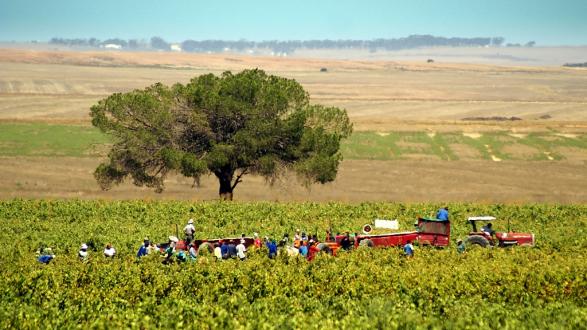The COVID-19 epidemic has made clear how much our society depends on essential services we too often take for granted. Among these is agricultural work and the people who plant and harvest our food.
For the Mexican Consulate in Los Angeles, this is a critical issue because most women and men—documented and undocumented—who work in the fields of this state are Mexican. They are tenacious and tireless workers who make possible the supply of farm products that we consume in California, throughout the United States, and even in Mexico. Yet despite their strategic importance, agricultural workers are among the least protected against the coronavirus pandemic.
According to the U.S. government, there are 20,000 Mexican agricultural workers in California covered by the H2A visa, which allows them to work temporarily in agricultural activities in this country. A quarter of them work in three counties—Ventura, Santa Barbara and San Luis Obispo—which are overseen by the Consulate of Mexico in Oxnard and within the jurisdiction of the consulate general in Los Angeles. We have been working closely with state and local health authorities to verify that farms in these counties comply with safety regulations and provide adequate responses and treatment in case a COVID-19 incident is identified.
But because of the structure of agricultural work, it is extremely difficult for the migrant population to maintain social distancing to avoid transmission of the coronavirus. Their commutes by bus or other vehicles may be crowded, making physical closeness almost inevitable. Once in the field, picking, harvesting, cleaning and packing produce typically requires them to work in close proximity to one another. In most cases, the housing provided by their employers is extremely crowded, with several people sharing a small living space, which makes maintaining social distance nearly impossible.
We need to ensure that all workers—regardless of their immigration status—have adequate housing and the means of transportation that will allow them to keep the recommended six-foot distance from others.
This situation puts the health of farm workers at great risk and with it the food supply in North America. Just recently, 19 Mexican agricultural workers were diagnosed with COVID-19 in British Columbia, Canada, according to the Mexican Consulate in Vancouver.
Since the beginning of the health crisis, the Mexican consulates have been doing our part to support the entire Mexican community, including those working in the agricultural fields. For more than two months, we have been working to inform farm workers in English, Spanish and Mixteco languages about public health recommendations and how to protect themselves.
However, we cannot address the extremely vulnerable situation of agricultural workers alone. In addition to our efforts, employers and state health authorities need to take action immediately before COVID-19 becomes a major crisis among these essential workers. Their current working and living conditions mean even a few infections could spread with frightening speed.
First, we need to ensure that all workers—regardless of their immigration status—have adequate housing and the means of transportation that will allow them to keep the recommended six-foot distance from others.
We owe the women and men who labor in the fields a huge debt, especially in these dangerous times. Protecting their health and well-being should be an urgent matter for all of us.
Second, workers must have all the protections required to do their job safely, including protective gear (for example, gloves, masks and gowns), proper spacing from one another, plenty of soap and water and enough time to wash frequently.
Third, farm workers should be considered a priority group to test for the coronavirus. Those who test negative can continue to work. Those who test positive must be provided immediate medical attention, and those who have been exposed to the virus should be quarantined for a period of time.
Finally, it is essential that the processes for issuing and renewing H2A visas continue smoothly to ensure that agricultural workers arrive with the needed legal protection to work the fields that need them more than ever.
We owe the women and men who labor in the fields a huge debt, especially in these dangerous times. Protecting their health and well-being should be an urgent matter for all of us.
____________________
Marcela Celorio is consul general of Mexico in Los Angeles and serves on the Pacific Council’s Mexico Initiative Advisory Board.
This op-ed was originally published by the Los Angeles Times.
The views and opinions expressed here are those of the author and do not necessarily reflect the official policy or position of the Pacific Council.




